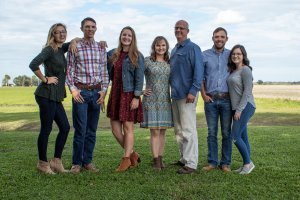June 2022 FloridAgriculture eNewsletter
 By J. Scott Angle
By J. Scott Angle
@IFAS_VP
Jeb Smith’s family began farming in Hastings 100 years ago. The UF Potato Investigation Lab moved into the neighborhood the next year. The Smiths and UF/IFAS have worked together ever since.
Smith had plenty of family history to share when I visited his farm in April, and UF/IFAS figured into much of it. He drove me by a fishpond that now-retired Extension agent Edsel Redden had helped him install and stock, for example.

Smith was a graduating 4-Her and incoming UF/IFAS College of Agricultural and Life Sciences freshman when he attended a 4-H event on campus. It was there he met an animal sciences undergraduate named Wendy Poole. During my visit, Smith introduced Wendy to me as his wife of 28 years.
In a photo on the mantle, Smith’s son Jared wore a green jacket—a third generation 4-Her. Wendy spoke with reverence for Nettie Ruth Brown, who was the 4-H agent for both Jeb and his father and in her retirement was Jared’s volunteer club leader.
Smith showed me where his family had hosted UF/IFAS field trials. He spoke about how his father and grandfather earned ag economics degrees from CALS. Smith knew about how his father and grandfather had worked with long-ago UF/IFAS faculty members such as D.R. Hensel on irrigation and Freddie Johnson on what later became known as integrated pest management.
The history was evident in what I couldn’t see, too: potatoes. But I sure heard about it. Nearly 20 years ago, Smith told me, his family found they could not follow UF/IFAS potato nutrient recommendations and make a profit.
He’s tried many things since: forestry, aquaculture, row crops, vegetables, perennial peanut, cotton and more. “I’ve lost money on all these things!” he said with a laugh.
He’s done well enough in timber, sod and cattle to have a sense of humor about the transition from his family’s former crop. In fact, he’s even donated machinery to our Hastings Agricultural Extension Center that’s used in potato trials.
I’ve called for more research and secured funding so that those trials can include an update of our potato nutrient recommendations.
I can’t say whether those updates will allow potatoes to sprout anew on Smith’s farm. In fact, Smith and I may not agree on how much fertilizer best achieves both yield and protection of water quality.
But as we toured the farm and talked, it became evident that we agree that the science of sustainability has to point the way toward profitability. If you can’t make money on a crop, it’s not sustainable. And we also shared a sense that as relatively new leaders of our respective organizations, we’re writing the next chapter in a long history.
Another thing we agreed on is that we want a fifth and sixth generation of Smith farmers. That’s good for the Smiths, good for the people they feed, good for the community they serve and good for the land for which they’ve been stewards for a century.
Smith and I will be doing plenty together in board rooms, in Tallahassee, on regular phone calls and at industry events.
By visiting Hastings, though, I got to sit in Smith’s living room and hear from the farmer and family man. I’m thankful to Smith for opening his home and farm to me. He taught me not only about his operation but about the one I lead.
Like our agents, I consider house calls important to building the relationships upon which both our organizations depend. The Smith-UF/IFAS history reminded me that Smith and I are the heirs to a strong, longstanding Farm Bureau-university relationship. We aim to bequeath it yet stronger.
J. Scott Angle is the University of Florida’s Senior Vice President for Agriculture and Natural Resources and leader of the UF Institute of Food and Agricultural Sciences (UF/IFAS).
